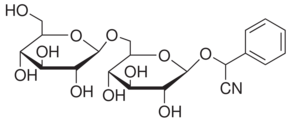| Product: | Amygdalin | ||||||
|---|---|---|---|---|---|---|---|
| Catalog Number: | 17336 | ||||||
| CAS Number: | 29883-15-6 | ||||||
| Synonyms: |
D-Mandelonitrile-β-gentiobioside; Laetrile |
||||||
| Pricing: |
|
||||||
| Formula: | C20H27NO11 | ||||||
| Chemical Purity: | >97% | ||||||
| Molecular Weight: | 457.43 | ||||||
| Structure: |

|
||||||
| Appearance: | Beige powder | ||||||
| Category: | Anti-cancer compounds | ||||||
| Stability: | Stable under recommended storage conditions. | ||||||
| Storage: |
Keep container tightly closed in a dry and well-ventilated place. Store under inert gas, hygroscopic |
||||||
| Transportation: |
Non-hazardous for transport |
||||||
| Literature References: |
E.E. Conn Int. Rev. Biochem. (Biochemistry of Nutrition 1A, A. Neuberger, T.H. Jukes, eds. Baltimore 27, 21, (1979); Syrigos, K.N., et al., In vitro cytotoxicity following specific activation of amygdalin by β-glucosidase conjugated to a bladder cancer-associated monoclonal antibody. Int. J. Cancer 78, 712-719, (1998); Moertel, C.G., et al., A clinical trial of amygdalin (Laetrile) in the treatment of human cancer. New Engl. J. Med. 306, 201-206, (1982); Chitnis, M.P., et al. , Studies on high-dose chemotherapy of amygdalin in murine P388 lymphocytic leukaemia and P815 mast cell leukaemia. J. Cancer Res. Clin. Oncol. 109, 208-209, (1985); Merck 14,597; Beil. 17,V,8,118 |
||||||
| MSDS: | |||||||
| Description: |
Cyanogenic glycoside that is a component of bitter almonds and apricot pits. There is no scientific evidence that amygdalin itself is an effective anti-cancer agent. Recent studies using β−glucoside linked to a tumor-associated monoclonal antibody to release cyanide at the tumor cell has shown significant cytotoxicity |
